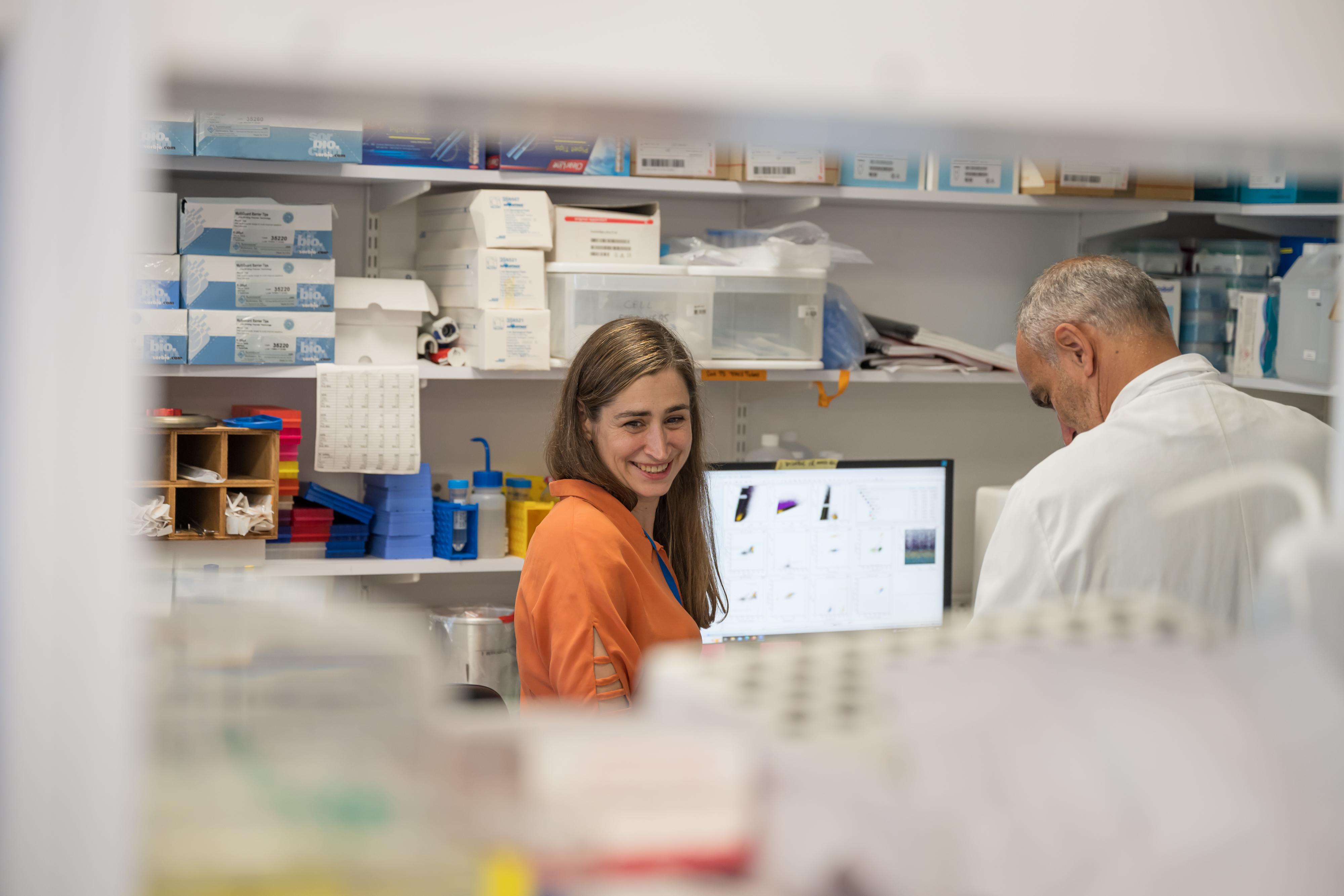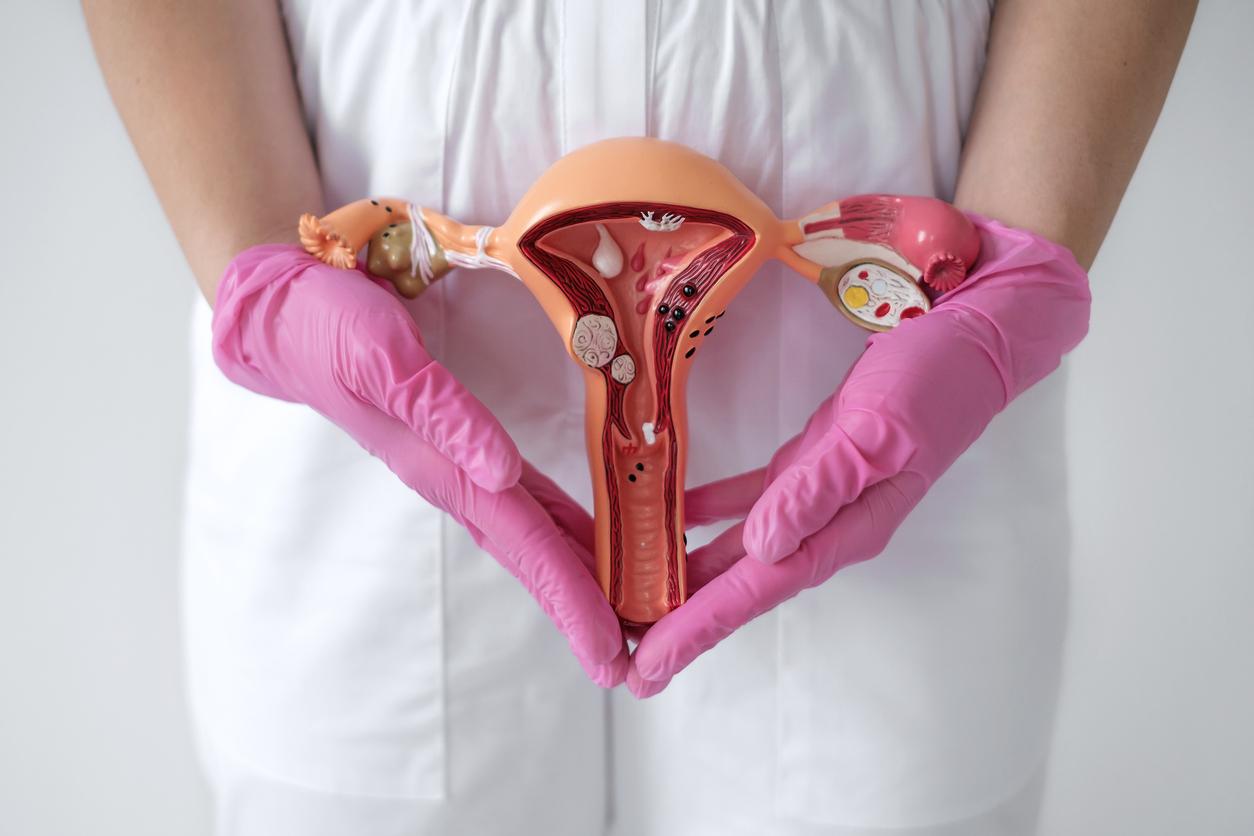I’endometriosis has nothing to do with a rare disease: this gynecological disease concern between 10% and 15% of women in France, a statistic “surely underestimated“according to Dr. Olivier Donner, obstetrician-gynecologist.
What exactly is happening? “Endometriosis corresponds schematically to the presence of endometrial glands and cells outside the uterine cavityexplains the specialist. Endometriosis lesions can proliferate through the wall of the uterus, in the abdominal cavity or even in certain organs (the ovaries in the case of ovarian endometriosis, for example).“She is responsible for pain during menstruation.
To know. There are obviously several stages of the disease: we speak ofendometriosis deep when the rectum, the intestines or the bladder are affected. “It is a very polymorphic disease, that is to say that it is found in a multitude of forms ranging from very mild to very severe. The location and size of the lesions also vary enormously”, specifies the surgeon Horace Roman, gynecological surgeon in Bordeaux.
Is it possible to get pregnant with endometriosis?
“It is estimated that 30 to 40% of these women would suffer from infertility”, according to Horace Roman.
Why does endometriosis prevent you from getting pregnant?Endometriosis can be responsible for infertility, that is to say difficulties in conceiving a child. Several scenarios:
- When endometriosis reaches the ovaries (ovarian endometriosis), these may be impaired in their functioning and ovulation may be of poorer quality, which reduces fertility.
- Endometriosis is frequently characterized by adhesions, that is to say by tissues “stuck” to each other: when these adhesions are located at the level of the uterine tubes, the spermatozoid-egg encounter can be complicated – even be impossible.
- Endometriosis, especially when severe, can lead to the development of an inflammatory environment inside and outside the uterus, which is not conducive to embryo implantation. Ditto when the disease results in hyper-contractibility of the uterine muscle.
Doctor’s opinion. “In patients who suffer from endometriosis, there is indeed a lower pregnancy raterecognizes Dr. Don. Nevertheless, the severity of the disease and its impact on fertility vary greatly from one patient to another: all women with endometriosis are not unable to conceive, and fortunately!“
Infertility and endometriosis: surgery or PMA, in which cases?
Do you suffer from endometriosis and want to have a baby? Then we have good news for you: If there is no cure for endometriosis, women with endometriosis do not necessarily have to give up pregnancy.
First step: make an appointment with your doctor or gynecologist: “the patients are then directed to an expert center for endometriosis, where they can take stock of their situation: how severe is the disease? Is there ovarian damage? Where is the oocyte reserve? What is the medical history?“explains Dr. Donner.
It’s good to know : some national (EndoFrance, EndoMind, etc.) or regional associations can also refer patients.
Then, a multidisciplinary consultation determines which treatment is the most appropriate: “schematically there are two possibilities: conservative surgery and medically assisted procreation (PMA)“says the specialist.
Surgery : “it consists of excision of the lesions while leaving the organs in place”, develops Doctor Roman. This involves surgically removing the lesions.
Nevertheless, the excision can be invasive on the ovaries, because it is impossible to separate the endometriotic cyst from the ovary which surrounds it. For this reason, some surgeons prefer to destroy lesions in situ using laser or plasma energy. “The purpose of this surgery is twofold: to reduce pain and increase the chances of spontaneous pregnancy”. However, sometimes the lesions are so large that, even after surgery, a natural pregnancy cannot be expected. “The patient will then be directed towards the second solution which is the in vitro fertilization (IVF)“.
- Conservative surgery
The objective of this surgical intervention: to eliminate the lesions of endometriosis while preserving the functioning of the pelvic organs – and above all, the mechanism of reproduction. “This surgery must be performed by a specialist, as part of a care pathway dedicated to endometriosis” recommends Dr. Don. It is then possible to become pregnant spontaneously – that is, as a result of sexual intercourse.
It should be noted that, according to recent clinical trials, conservative surgery would allow approximately 70% of patients with deep endometriosis to become pregnant.
- Medically assisted procreation (PMA)
This alternative is particularly aimed at women with endometriosis who have already been operated on (with residual lesions) or who are not very symptomatic: “it involves practicing in vitro fertilization, i.e. bringing the sperm and egg together outside the uterus, then selecting an embryo and implanting it in the uterine cavity of the patient“explains the obstetrician-gynecologist.
In the event of severe ovarian damage (understand: if the ovaries have been damaged by disease or surgery), egg donation may be considered.
How is a pregnancy with endometriosis? What risks?
Good news : in the majority of cases, pregnancy does not aggravate the severity of the disease. “Because it is characterized by a greater secretion of progesterone, pregnancy even tends to put endometriosis “in rest”emphasizes Dr. Don. Symptoms are generally less severe, although being pregnant obviously does not cure the disease.“More rarely, a slight progression of endometriosis can be observed during pregnancy.
Are there more complications during pregnancy? “Endometriosis is associated with an increased risk of placenta previa, i.e. inserted too low and partially or totally covering the cervix: a cesarean delivery is then necessary.“explains the gynecologist-obstetrician. The disease does not, however, entail “no major complications” according to the specialist.
Pregnancy, the best cure for endometriosis
Regarding the risks during pregnancy, doctors have no certainty. “Some colleagues have observed a slight increase in the risk ofpremature delivery or of miscarriage. There is also talk of cases of internal bleeding during pregnancy, but these are rare and isolated cases”, specifies Horace Roman. For childbirth, the risks do not come from the disease itself, but from the surgeries that took place beforehand. “If they touched the terminal part of the rectum or the vagina, the caesarean section may be preferred, because a natural delivery could lead to tearing of the perineum and sequelae such asincontinence anal and urinary”.
As for follow-up during pregnancy, it is classic. “It is often said that pregnancy is the best cure for endometriosis, and this is not completely true because the disease is just in a dormant state. After delivery, it will probably resume its natural course.feeding with milk prolonged and a taking of contraceptive pill without a rule, the dormant state may persist for several more years”. However, Dr. Roman insists that in theory no patient should wait for endometriosis to heal after pregnancy.
Read also : Testimonials: they won their fight against endometriosis
Sources:
- Interview with Dr. Olivier donne, gynecologist-obstetrician at the Urban V Polyclinic (ELSAN group) – 2021
- Interview Horace Roman, gynecological surgeon specializing in endometriosis in Bordeaux – 2019


















